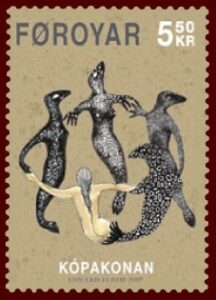
A Faroese stamp featuring the legend of Kópakonan (the Seal Woman).
Whilst working on data capture for the Decoding Hidden Heritages Project, I came across this tale of a seal-woman, or selkie (ScG: ròn ‘seal’), that struck a chord with me. Stanley Robertson from Aberdeen tells of the story he heard from his father, ‘The Selkie o the River Dee’, which Stanley was told was a true story and referred to an ancestor of his.
A man spies a seal-woman coming out of the River Dee and shedding her skin on the shore. The man takes the skin and hides it from her to force the woman to go home with him and be his wife. They have several children together and one day the children find the seal skin the man had hidden. The woman takes the skin and disappears back into the River Dee, never to return, with the man arriving just in time to see her go.
Upon reading the story, it immediately occurred to me that this seems to have been a tragic incident that was ‘spun’ into a whimsical tale, likely for the benefit of the children involved. Surely enough, Stanley goes on to say that he thinks the woman might have actually committed suicide, as the story referred to ”real” people. I think this story is fascinating because it has the ability to truly resonate with the listener or reader on a very emotional level. You don’t need to be an expert on folktales to understand why or how it came to be. Similar seal-woman (or mermaid) stories are found across the North Atlantic, for example in Irish, Icelandic and Faroese folklore.
A much more cheerful selkie reference in popular culture can be seen in the beautifully-illustrated Irish feature film: Song of the Sea.
To hear a similar story in Gaelic, click here.
To hear more stories on selkies (male and female versions), visit the Tobar an Dualchais website.
This blog post was written by Cristina Horvath, the newly-appointed Digitisation & Data Entry Technician for the Decoding Hidden Heritages Project.
(https://commons.wikimedia.org/wiki/File:Faroese_stamp_579_the_seal_woman.jpg)



Leave a Reply